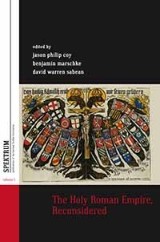Details

The Holy Roman Empire, Reconsidered
Spektrum: Publications of the German Studies Association, Band 1 1. Aufl.
|
CHF 32.00 |
|
| Verlag: | Berghahn Books |
| Format: | |
| Veröffentl.: | 01.10.2010 |
| ISBN/EAN: | 9781845459925 |
| Sprache: | englisch |
| Anzahl Seiten: | 346 |
DRM-geschütztes eBook, Sie benötigen z.B. Adobe Digital Editions und eine Adobe ID zum Lesen.
Beschreibungen
<p> The Holy Roman Empire has often been anachronistically assumed to have been defunct long before it was actually dissolved at the beginning of the nineteenth century. The authors of this volume reconsider the significance of the Empire in the sixteenth, seventeenth, and eighteenth centuries. Their research reveals the continual importance of the Empire as a stage (and audience) for symbolic performance and communication; as a well utilized problem-solving and conflict-resolving supra-governmental institution; and as an imagined political, religious, and cultural "world" for contemporaries. This volume by leading scholars offers a dramatic reappraisal of politics, religion, and culture and also represents a major revision of the history of the Holy Roman Empire in the early modern period.</p>
<p> List of Illustrations<br> Series Preface<br> Volume Preface<br> List of Contributors</p>
<p> <strong>Introduction:</strong> The Holy Roman Empire in History and Historiography<br> <em>Jason Coy</em></p>
<p> <strong>SECTION I: PRESENCE, PERFORMANCE, AND TEXT</strong></p>
<p> <strong>Chapter 1.</strong> Discontinuities: Political Transformation, Media Change, and the City in the Holy Roman Empire from the Fifteenth to Seventeenth Centuries<br> <em>Philip Hoffmann-Rehnitz</em></p>
<p> <strong>Chapter 2.</strong> Overloaded Interaction: Effects of the Growing Use of Writing in German Imperial Cities, 1500–1800<br> <em>Alexander Schlaak</em></p>
<p> <strong>Chapter 3.</strong> Princes’ Power, Aristocratic Norms, and Personal Eccentricities: Le Caractère Bizarre of Frederick William I of Prussia (1713–1740)<br> <em>Benjamin Marschke</em></p>
<p> <strong>SECTION II: SYMBOLIC MEANING, IDENTITY, AND MEMORY</strong></p>
<p> <strong>Chapter 4.</strong> The Illuminated Reich: Memory, Crisis, and the Visibility of Monarchy in Late Medieval Germany<br> <em>Len Scales</em></p>
<p> <strong>Chapter 5.</strong> The Production of Knowledge about Confessions: Witnesses and their Testimonies about Normative Years in and after the Thirty Years’ War<br> <em>Ralf-Peter Fuchs</em></p>
<p> <strong>Chapter 6.</strong> Staging Individual Rank and Corporate Identity: Pre-Modern Nobilities in Provincial Politics<br> <em>Elizabeth Harding</em></p>
<p> 7. The Importance of Being Seated: Ceremonial Conflict in Territorial Diets<br> <em>Tim Neu</em></p>
<p> <strong>SECTION III: CEREMONY, PROCEDURE, AND LEGITIMATION</strong></p>
<p> <strong>Chapter 8.</strong> Ceremony and Dissent: Religion, Procedural Conflicts, and the “Fiction of Consensus” in Seventeenth-Century Germany<br> <em>David M. Luebke</em></p>
<p> <strong>Chapter 9.</strong> Contested Bodies: Schwäbisch Hall and its Neighbors in Conflicts Regarding High Jurisdiction (1550–1800)<br> <em>Patrick Oelze</em></p>
<p> <strong>Chapter 10.</strong> Conflict and Consensus around German Princes’ Unequal Marriages: Prince’s Autonomy, Emperor’s Intervention, and the Juridification of Dynastic Politics<br> <em>Michael Sikora</em></p>
<p> <strong>Chapter 11.</strong> Power and Good Governance: The Removal of Ruling Princes in the Holy Roman Empire, 1680–1794<br> <em>Werner Trossbach</em></p>
<p> <strong>SECTION IV: IMPERIAL INSTITUTIONS, CONFESSION, AND POWER RELATIONS</strong></p>
<p> <strong>Chapter 12.</strong> Marital Affairs as a Public Matter within the Holy Roman Empire: The Case of Duke Ulrich and Duchess Sabine of Württemberg at the Beginning of the Sixteenth Century<br> <em>Michaela Hohkamp</em></p>
<p> <strong>Chapter 13.</strong> The Corpus Evangelicorum: A Culturalist Perspective on its Procedure in the Eighteenth-Century Holy Roman Empire<br> <em>Andreas Kalipke</em></p>
<p> <strong>Chapter 14. </strong>Gallican Longings: Church and Nation in Eighteenth-Century Germany<br> <em>Michael Printy</em></p>
<p> <strong>Conclusion:</strong> New Directions in the Study of the Holy Roman Empire - A Cultural Approach<br> <em>André Krischer</em></p>
<p> Glossary<br> Bibliography<br> Index</p>
<p> <strong>Introduction:</strong> The Holy Roman Empire in History and Historiography<br> <em>Jason Coy</em></p>
<p> <strong>SECTION I: PRESENCE, PERFORMANCE, AND TEXT</strong></p>
<p> <strong>Chapter 1.</strong> Discontinuities: Political Transformation, Media Change, and the City in the Holy Roman Empire from the Fifteenth to Seventeenth Centuries<br> <em>Philip Hoffmann-Rehnitz</em></p>
<p> <strong>Chapter 2.</strong> Overloaded Interaction: Effects of the Growing Use of Writing in German Imperial Cities, 1500–1800<br> <em>Alexander Schlaak</em></p>
<p> <strong>Chapter 3.</strong> Princes’ Power, Aristocratic Norms, and Personal Eccentricities: Le Caractère Bizarre of Frederick William I of Prussia (1713–1740)<br> <em>Benjamin Marschke</em></p>
<p> <strong>SECTION II: SYMBOLIC MEANING, IDENTITY, AND MEMORY</strong></p>
<p> <strong>Chapter 4.</strong> The Illuminated Reich: Memory, Crisis, and the Visibility of Monarchy in Late Medieval Germany<br> <em>Len Scales</em></p>
<p> <strong>Chapter 5.</strong> The Production of Knowledge about Confessions: Witnesses and their Testimonies about Normative Years in and after the Thirty Years’ War<br> <em>Ralf-Peter Fuchs</em></p>
<p> <strong>Chapter 6.</strong> Staging Individual Rank and Corporate Identity: Pre-Modern Nobilities in Provincial Politics<br> <em>Elizabeth Harding</em></p>
<p> 7. The Importance of Being Seated: Ceremonial Conflict in Territorial Diets<br> <em>Tim Neu</em></p>
<p> <strong>SECTION III: CEREMONY, PROCEDURE, AND LEGITIMATION</strong></p>
<p> <strong>Chapter 8.</strong> Ceremony and Dissent: Religion, Procedural Conflicts, and the “Fiction of Consensus” in Seventeenth-Century Germany<br> <em>David M. Luebke</em></p>
<p> <strong>Chapter 9.</strong> Contested Bodies: Schwäbisch Hall and its Neighbors in Conflicts Regarding High Jurisdiction (1550–1800)<br> <em>Patrick Oelze</em></p>
<p> <strong>Chapter 10.</strong> Conflict and Consensus around German Princes’ Unequal Marriages: Prince’s Autonomy, Emperor’s Intervention, and the Juridification of Dynastic Politics<br> <em>Michael Sikora</em></p>
<p> <strong>Chapter 11.</strong> Power and Good Governance: The Removal of Ruling Princes in the Holy Roman Empire, 1680–1794<br> <em>Werner Trossbach</em></p>
<p> <strong>SECTION IV: IMPERIAL INSTITUTIONS, CONFESSION, AND POWER RELATIONS</strong></p>
<p> <strong>Chapter 12.</strong> Marital Affairs as a Public Matter within the Holy Roman Empire: The Case of Duke Ulrich and Duchess Sabine of Württemberg at the Beginning of the Sixteenth Century<br> <em>Michaela Hohkamp</em></p>
<p> <strong>Chapter 13.</strong> The Corpus Evangelicorum: A Culturalist Perspective on its Procedure in the Eighteenth-Century Holy Roman Empire<br> <em>Andreas Kalipke</em></p>
<p> <strong>Chapter 14. </strong>Gallican Longings: Church and Nation in Eighteenth-Century Germany<br> <em>Michael Printy</em></p>
<p> <strong>Conclusion:</strong> New Directions in the Study of the Holy Roman Empire - A Cultural Approach<br> <em>André Krischer</em></p>
<p> Glossary<br> Bibliography<br> Index</p>
<p> <strong>Jason Philip Coy</strong> is an Associate Professor of History at the College of Charleston, in Charleston, South Carolina. He has received a DAAD Research Grant and a Maria Sibylla Merian Fellowship for Postdoctoral Studies from the University of Erfurt, Germany. He is the author of <em>Strangers and Misfits: Banishment, Social Control, and Authority in Early Modern Germany</em> (2008).</p>

















